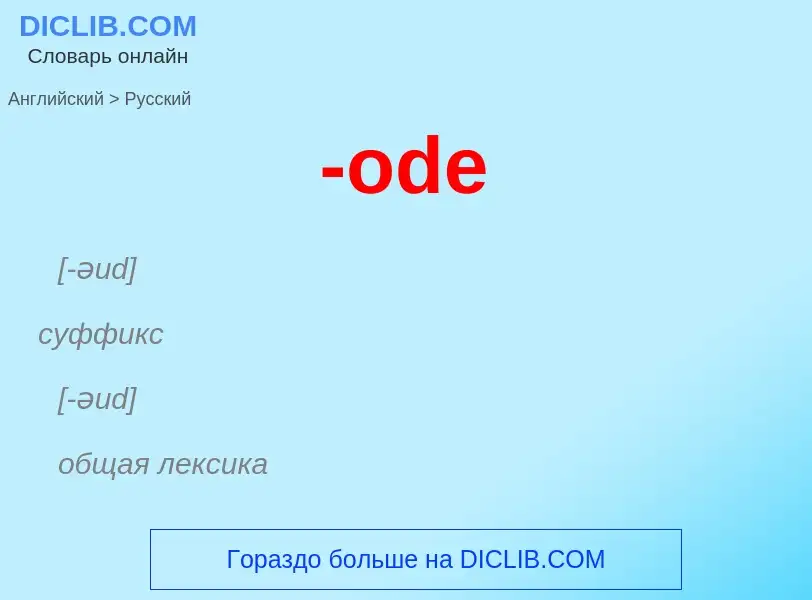Μετάφραση και ανάλυση λέξεων από την τεχνητή νοημοσύνη ChatGPT
Σε αυτήν τη σελίδα μπορείτε να λάβετε μια λεπτομερή ανάλυση μιας λέξης ή μιας φράσης, η οποία δημιουργήθηκε χρησιμοποιώντας το ChatGPT, την καλύτερη τεχνολογία τεχνητής νοημοσύνης μέχρι σήμερα:
- πώς χρησιμοποιείται η λέξη
- συχνότητα χρήσης
- χρησιμοποιείται πιο συχνά στον προφορικό ή γραπτό λόγο
- επιλογές μετάφρασης λέξεων
- παραδείγματα χρήσης (πολλές φράσεις με μετάφραση)
- ετυμολογία
-ode - translation to ρωσικά
[-əud]
суффикс
[-əud]
общая лексика
встречается в названиях электротехнических и электронных приборов и их элементов
образует имена существительные, заимствованные из древнегреческого языка, со значением похожий
подобный
напоминающий
[əud]
существительное
общая лексика
ода
поэма
предназначенная для пения
Ορισμός
Βικιπαίδεια

An ode (from Ancient Greek: ᾠδή, romanized: ōdḗ) is a type of lyric poetry. Odes are elaborately structured poems praising or glorifying an event or individual, describing nature intellectually as well as emotionally. A classic ode is structured in three major parts: the strophe, the antistrophe, and the epode. Different forms such as the homostrophic ode and the irregular ode also enter.
Greek odes were originally poetic pieces performed with musical accompaniment. As time passed on, they gradually became known as personal lyrical compositions whether sung (with or without musical instruments) or merely recited (always with accompaniment). The primary instruments used were the aulos and the lyre (the latter was the most revered instrument to the ancient Greeks).
There are three typical forms of odes: the Pindaric, Horatian, and irregular. Pindaric odes follow the form and style of Pindar. Horatian odes follow conventions of Horace; the odes of Horace deliberately imitated the Greek lyricists such as Alcaeus and Anacreon. Irregular odes use rhyme, but not the three-part form of the Pindaric ode, nor the two- or four-line stanza of the Horatian ode. The ode is a lyric poem. It conveys exalted and inspired emotions. It is a lyric in an elaborate form, expressed in a language that is imaginative, dignified and sincere. Like the lyric, an ode is of Greek origin.


